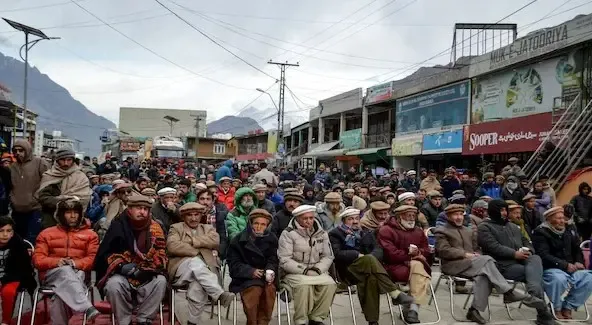Demonstrations Over Power Shortages Disrupt Pakistan's Trade Link with China

Islamabad, Jan 8 (NationPress) The vital trade corridor between Pakistan and China has remained obstructed for the fifth consecutive day due to widespread protests concerning chronic power outages affecting the mountainous region of Pakistan-Occupied Gilgit-Baltistan, according to media reports.
Protest organizers in Hunza, a scenic city with a population exceeding 70,000 in Gilgit-Baltistan, have pledged to persist with their demonstrations until their demands are addressed.
Leaders of the rally highlighted the town's ongoing insufficient electricity supply, pointing out that residents face electricity outages lasting up to 23 hours during this severe winter season.
Both men and women took part in the protest, enduring daytime temperatures of -4 degrees Celsius and nighttime lows of -10 degrees Celsius, as communicated by rally attendees to a media outlet via phone.
Rahim Aman, a local resident, noted a steady increase in protester numbers, mentioning that female activists utilized vehicles and loudspeakers to rally support for the demonstration.
Representatives from local political parties, the business community, and hotel associations also joined the protest.
Despite negotiations from local authorities, they were unable to convince the protesters to disperse and reopen the Karakoram Highway, which connects Pakistan to China.
Hunza is located along the picturesque route that passes through the Gilgit-Baltistan region, adjacent to China's western Xinjiang province.
Traders have reported that numerous containers filled with commercial goods are stranded on both sides of the highway because of the ongoing sit-in.
This disruptive protest emerged just over a month after Pakistan and China announced the year-round operation of their sole land port, the Khunjerab Pass, to enhance trade relations between the two nations.
The world's highest paved border crossing, located nearly 190 km from Hunza, sits at an elevation exceeding 4,600 meters and was previously closed for four months each year due to heavy snowfall.
The economically disadvantaged region of Gilgit-Baltistan heavily relies on hydropower, but electricity generation nearly halts in winter due to the freezing of rivers and lakes. As a result, local residents and businesses, including hotels, are forced to use expensive thermal generators to sustain their power supply.
Local residents and experts have pointed out that the increasing reliance on such generators by larger hotels and commercial entities is adversely affecting the environment in Hunza and its surroundings.
The United Nations highlights that the regions of Pakistan are home to some of the largest glaciers outside the Arctic and are already facing significant threats from global warming.
The Khunjerab Pass is a key element of the China-Pakistan Economic Corridor (CPEC), a multibillion-dollar initiative aimed at developing comprehensive trade and transit infrastructure between the two most populous nations in the world.
Beijing has invested over $25 billion in Pakistan since the inception of the CPEC a decade ago and is keen to utilize Gwadar, a Chinese-managed port in Pakistan on the Arabian Sea, as a strategic entry point to global markets.









